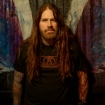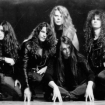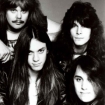New to the Revolver store are exclusive colored vinyl editions of Forbidden's first two albums, Forbidden Evil and Twisted Into Form. They're limited to 250 each so get yours before they're gone!
The San Francisco Bay Area is known far and wide as the epicenter of the Eighties thrash movement, and one of the bands central to the scene's second wave was Forbidden. While they may not have achieved the same widespread recognition as Bay Area forebears like Metallica and Exodus or peers like Testament and Death Angel, Forbidden left an indelible mark on the genre with two now-classic albums — the 1988 debut Forbidden Evil (which was also the band's original name) and the 1990 follow-up Twisted Into Form.
Both efforts are packed with the sort of breakneck precision riffing, pounding drums, bark-to-a-scream vocals and all-around go-for-the-throat untamed wildness that characterized thrash in the Eighties, with Twisted Into Form adding a previously untapped progressive-minded songwriting approach and moodier acoustic instrumentation to the mix. While Forbidden would release three more records before going on hiatus in 2012 — Distortion (1994), Green (1997) and Omega Wave (2010) — it was the one-two punch of their first pair of Combat Records–issued albums that cemented their position as one of the era's fiercest outfits.
To be sure, even those who have possibly never heard of Forbidden will be familiar with several members of their early lineup, including Robb Flynn who co-founded the band (before leaving to join fellow Bay Area thrashers Vio-lence and, later, form Machine Head), and drummer Paul Bostaph, who, following his tenure with Forbidden, spent years behind the kit for Testament, Exodus and most notably Slayer.
While Flynn never appeared on a Forbidden album, he co-wrote a handful of Forbidden Evil tracks, including the title cut, "As Good As Dead" and the raging, anthemic opener, "Chalice of Blood." Bostaph, meanwhile, appeared on both Forbidden Evil and Twisted Into Form, alongside singer Russ Anderson, guitarists Craig Locicero and Glen Alvelais (replaced by Tim Calvert on Twisted) and bassist Matt Camacho.
In an exclusive interview with Revolver, Bostaph looks back on the making of these seminal records, as well as Forbidden's formative years and what it was like to be a part of the "intense" Bay Area thrash scene. And if you're wondering, perhaps, what Robb Flynn's nickname was back in the day, or what James Hetfield thought of Forbidden? Read on …
HOW DID YOU COME TO JOIN FORBIDDEN?
PAUL BOSTAPH My cousin, Jim Pittman, was the original drummer, and he started the band with Robb Flynn when they were in high school. They would go jam at lunchtime — I think "Chalice of Blood" was actually written during lunch, which is pretty outstanding. They started playing some gigs at places like [Berkeley club] Ruthie's Inn, but my cousin didn't have any way to get his drums to the venues. So I was like, "Dude, I'll help you." Because I had a van to haul my own drums.
So I would go check out the shows and stuff, and at some point it came up that the band was going to move on from playing with Jim, and they approached me. The first time I said no, because Jim was my cousin. But then it was clear that he just wasn't the right fit with the guys. They asked me again and I thought they were a really good band so I said yes. It put a strain on my relationship with my cousin for a little while, but we're good now. And the rest is kind of history.
EVERYBODY KNOWS ROBB FLYNN FROM HIS TIME WITH VIO-LENCE AND MACHINE HEAD. WHAT WAS HE LIKE BACK IN THE FORBIDDEN DAYS?
Robb, it makes sense to me that he's the frontman of a band now, because even back then he had that frontman swagger about him. He was an incredibly, incredibly talented guitar player, and he could write — I think "As Good as Dead" was the first song that was written when I joined the band, and unfortunately I think it was also the last song Robb wrote with the band before he left. But he just had that swagger. I guess the best way to put it is he was young, like we all were. And it's funny — one of the nicknames he had was Robb the Slob. 'Cause I guess he always kind of looked a little unkept. He'd wear these ratty shirts and he looked like he just got up out of bed. [Laughs] He doesn't look like that now.
THE BAY AREA THRASH SCENE WAS SO FERTILE BACK THEN. CAN YOU DESCRIBE WHAT IT WAS LIKE TO BE A PART OF THAT IN THE EARLY DAYS OF FORBIDDEN?
It was intense. At times I felt like a bit of an outsider because there were all these bands that were ahead of us. There was this genuine interest in the scene because of Metallica and Exodus, but you could go watch bands play five to six days a week at places like [San Francisco club] the Stone, and there were so many good bands. We'd go to band practice and some nights we'd just go straight to see whoever we could, just to learn from them. We would go see Death Angel and some of the guys in my band became friends with those guys. And Legacy, which became Testament, they liked our band and they were packing the Stone, selling it out. So we got to play shows with them. Even Vio-lence was packing the Stone.
The amount of energy that was going on in those clubs at the time, it was just real. Not saying anything else wasn't real, but it was just like, you'd go there and see all these people that you knew and all these musicians from other bands that you respected. And you'd all be at the same gig. You'd start talking and passing around experiences and knowledge. And of course, you had Exodus and Metallica, who were on a different level by that time.
WOULD YOU CROSS PATHS WITH THE METALLICA GUYS AT ALL?
You would see James [Hetfield] at the Stone every once in a while. He would come to watch a band play. He even came to watch Forbidden one time. Debbie [Abono, then Forbidden manager] asked him as a favor, because he was friends with her son. So he came and gave his critique. And I'll always remember the critique he gave us. He said that we were a good band, but his critique of me was I wasn't solid enough. And it was just like, man, when I heard that...
HOW DID THAT MAKE YOU FEEL?
I took a step back from myself and what I thought about my playing at the time. Instead of me going, "Oh man, what does he know about drums?" I was like, "OK, I need to work harder."
WITH THAT KIND OF TALENT BASE IN THE BAY AREA, HOW DID FORBIDDEN SEPARATE ITSELF FROM THE PACK?
When Forbidden was up and coming we got compared to everybody. It was always like, "They're a mix of Exodus and so-and-so." So we tried to not fit into that. So many riffs got thrown in the trash because they sounded like somebody else. Because there was a Bay Area sound that was … I don't want to say generic, but it became a general sound. So we worked hard to not to be just "that." Because we were already behind the curve — the Bay Area scene was this wave, and we jumped on the wave right before it hit the shore. We got through right as it was ending.
THAT'S TRUE — YOU SIGNED TO COMBAT AND RELEASED YOUR DEBUT, FORBIDDEN EVIL, IN 1988.
We were excited to be signed, obviously, because there was so many great bands on that label that we liked. As a matter of fact, we were so excited that we signed on a Friday and we went in the studio that Monday to record Forbidden Evil. We're like, "We're ready now. Let's go!" And the thing was, everybody in the band was ready except for me, because we had just lost our rehearsal space. We were moving out of that space and we were trying to find another one. So when we signed to Combat it was this weird timing where I hadn't played drums in two weeks. I always listen to that record and I think, "If we had just said, 'Yeah, we're going to rehearse for a couple of weeks, do some preproduction to make sure we're on top of it…' But I'm not criticizing the past. It's a photograph of what we were then.
LESS THAN A MONTH AFTER THE ALBUM CAME OUT YOU PLAYED THE COMBAT ULTIMATE REVENGE 2 SHOW IN PHILLY.
That was our first-ever out-of-town gig. I remember I flew out with my mom — the first time I'd ever been on an airplane. I was white-knuckled the whole time. I thought, This plane is gonna crash. [Laughs] At the show, we were super excited and we played super-fast. Because there was only one way we knew how to attack it … and that was just to attack it. When I look back, I see a band that still needed some seasoning. We were so raw. But it was an amazing experience.
YOU PLAYED ALONGSIDE DEATH AND DARK ANGEL AT THAT GIG.
It was killer. Death was just this thing that… I had heard Death but I had never seen them. So when I finally did, it was like, "Wow, this is just something I've never expected…" And watching [then Dark Angel drummer] Gene Hoglan was the biggest impression of the night for me. He was just effortless.
THE HEADLINER FOR THAT SHOW WAS RAVEN, WHICH SEEMS AN ODD FIT NEXT TO ALL THESE EXTREME METAL BANDS.
I felt really bad for Raven, because Death and Dark Angel and even us, we all had a good crowd. But when Raven went onstage the place was empty. I didn't know people could do that. Because in the Bay Area everybody stayed for everybody. I was like, "Holy crap…" But people weren't interested in them anymore at the time.
WHAT WAS THE TOUR IN SUPPORT OF FORBIDDEN EVIL LIKE?
We went over to Europe with Sacred Reich, which was the first tour we did supporting that record. And the one thing has always been a stand-out forever in my life is breaking my hand on that tour. We had a day or two in Germany after playing the Dynamo [Open Air] festival [captured on the Raw Evil — Live at the Dynamo EP] and I broke my hand and had to get a cast put on. I basically played the whole tour with one hand.
HOW DID IT HAPPEN?
I punched a wall. [Laughs] We told a different story at the time, because we just didn't want any negative press. But me and Russ got into it. He's a friend of mine and I don't believe in punching my friends, so I walked away. So Greg Hall, the drummer from Sacred Reich, was taking me outside, and as I was walking down the stairs something inside me snapped and I punched a wall. I pulled my punch, but apparently there's not a lot of drywall in Europe, so I basically punched a brick wall.
MANY PEOPLE CONSIDER YOUR SECOND ALBUM, TWISTED INTO FORM, A MORE PROGRESSIVE-SOUNDING EFFORT THAN ITS PREDECESSOR. WHY DO YOU THINK THIS IS?
We were pretty cerebral on that record in terms of how much thought we put into stuff at times. But one thing that changed with Twisted was Tim Calvert replaced Glen Alvelais. And Tim is a different kind of person than Glen. He was a big Queensrÿche fan, but he was also very dark. And he loved acoustic things and clean parts. We really connected and we had a lot more conversations about what we wanted to do and what we liked. We were way more introspective of our style, I think, and, and how we wanted to incorporate certain things that Tim brought to the table. If you listen to stuff on the first album like "Off the Edge" or "Through Eyes of Glass," they're different songs than some of the stuff on Twisted, like "Spiral Depression," where there are a lot of darker acoustic parts.
SOON AFTER THAT RECORD YOU LEFT FORBIDDEN. WHY?
I just didn't see things the same anymore. I didn't like some of the internal politics that were happening. We were off Combat, and I wanted to take a couple of weeks to step away because we were trying to get signed again. We had a label interested in us, we were packing places, we were doing really well. I think I just needed to get a clear head because we'd been hammering at it for so long. But I got a phone call three or four days after that from our manager at the time and he goes, "Well, the guys have been talking and they basically don't want to wait for you. And that's when I was like, "OK, I guess I'm out of the band." But I get why they did it and I don't blame them.
AND THEN YOU JOINED SLAYER.
So this is a true story: The very next day I was over my friend's house jamming, and before we start playing I get a phone call from my drum tech, who was my roommate at the time. And he's like, "You wouldn't believe who called the house — Rick Sales." I go, "Who's Rick Sales?" He says, "The manager of Slayer." And I'm like, "Okaaaay…" My drum tech says, "He wants to know if you want to come out and audition for the band." And it's like, "I just left Forbidden — you're telling me that I just got a phone call from Slayer?" But it was true. He gave me the phone number, I called Rick and the rest is history. When I tell people that story, they don't believe it. The guys in Forbidden think I had it all worked out, that I already had this audition. But I didn't.
IN ADDITION TO SLAYER YOU WENT ON TO PLAY WITH EXODUS AND TESTAMENT, AMONG OTHER ACTS. BUT TO YOUR MIND, WHAT IS THE LEGACY OF FORBIDDEN?
I would say you're probably asking the wrong person to answer that question. I couldn't tell you. Maybe it's that, over time, people probably realized that we weren't just like everybody else. The fact that we tried to be different on those record actually did stand out. It just took a long time for people to see that.








